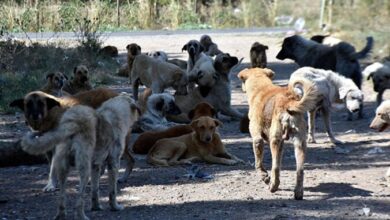Dog Allergy Symptoms and Solutions
Dog Allergy Symptoms and Solutions
Dogs, much like humans, can develop allergies to various substances, leading to uncomfortable symptoms. These allergies can be caused by environmental factors, food, or even parasites. This article will discuss common signs of allergies in dogs and how to manage them effectively.

Allergy Symptoms in Dogs
Allergies in dogs manifest when their immune system overreacts to certain substances. Common symptoms include:
Skin Issues
- Itching: Dogs may exhibit excessive itching, especially around the ears, paws, face, and belly.
- Redness and Irritation: Allergic reactions can cause red, swollen, and irritated skin.
- Hair Loss: Persistent scratching and irritation can lead to hair loss, often in specific areas of the body.
- Skin Bumps: Small bumps or rashes may appear on the dog’s skin as part of the allergic reaction.
Digestive Problems
- Vomiting and Diarrhea: Food allergies often cause digestive issues like vomiting, diarrhea, and abdominal pain.
- Gas and Bloating: Dogs may experience gas and bloating if they have a sensitivity to certain foods.
Respiratory Issues
- Sneezing: Airborne allergens like pollen can cause frequent sneezing.
- Coughing: Allergies may trigger coughing as a response.
- Watery Eyes: Eyes may become watery and red due to allergies.

Common Causes of Allergies in Dogs
Several factors can trigger allergies in dogs, including environmental allergens, food, and flea bites.
Environmental Allergens
- Pollens: Grass and tree pollens can cause seasonal allergies, especially in spring.
- Dust and Mold: Dust mites and mold spores found indoors can also cause allergic reactions.
Food Allergies
Some dogs are allergic to ingredients such as grains, chicken, beef, or dairy products, which typically result in skin or digestive issues.
Flea Allergy
Flea bites can cause allergic reactions in some dogs, particularly due to the flea’s saliva, leading to intense itching and irritation.
Solutions for Dog Allergies
Veterinary Treatment
If your dog shows signs of allergies, it’s crucial to consult a veterinarian. They can perform tests to determine the cause and recommend appropriate treatments.
Allergy Tests
Your vet may conduct blood or skin tests to identify specific allergens, allowing for a targeted treatment plan.
Diet Changes
If food allergies are diagnosed, your vet may recommend a hypoallergenic diet that avoids common allergens and helps manage symptoms.

Environmental Adjustments
To reduce your dog’s exposure to environmental allergens, consider these steps:
- Regular Cleaning: Clean your home frequently to minimize dust and mold exposure.
- Air Purifiers: Use air purifiers to reduce airborne allergens such as pollen and dust.
- Limited Outdoor Exposure: During pollen seasons, try to limit your dog’s time outside.
Medications and Shampoos
- Antihistamines: Vets may prescribe antihistamines to alleviate symptoms like itching and swelling.
- Steroids: In severe cases, corticosteroids can help control inflammation and itching.
- Special Shampoos: Bathing your dog with medicated or hypoallergenic shampoos can soothe irritated skin.
Allergies in dogs can significantly affect their quality of life, but early diagnosis and appropriate treatment can help manage the condition. If you notice any of the symptoms mentioned, consult your vet for the best approach to keep your dog healthy and comfortable.





Bir Yorum